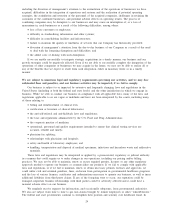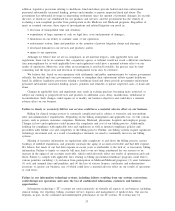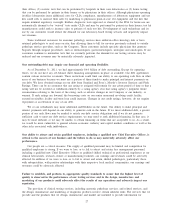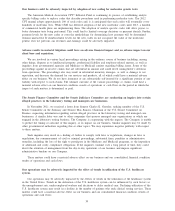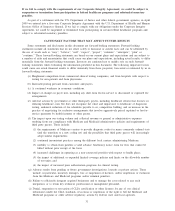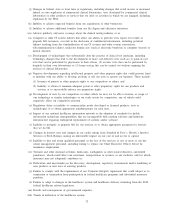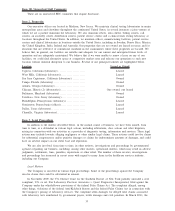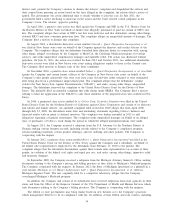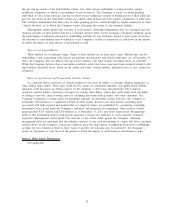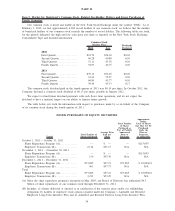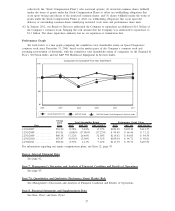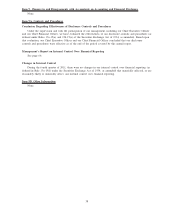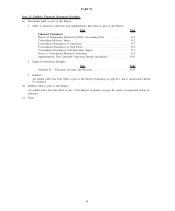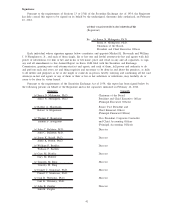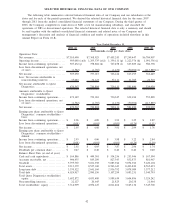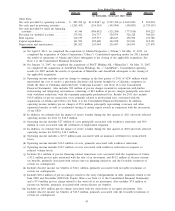Quest Diagnostics 2011 Annual Report Download - page 40
Download and view the complete annual report
Please find page 40 of the 2011 Quest Diagnostics annual report below. You can navigate through the pages in the report by either clicking on the pages listed below, or by using the keyword search tool below to find specific information within the annual report.district court granted the Company’s motion to dismiss the relators’ complaint and disqualified the relators and
their counsel from pursuing an action based on the facts alleged in the complaint; the relators filed a notice of
appeal. The government was given additional time to decide whether to join the case. In July 2011, the
government filed a notice declining to intervene in the action and the Court entered a final judgment in the
Company’s favor. The relators’ appeal is pending.
In April 2010, a putative class action was filed against the Company and NID in the U.S. District Court for
the Eastern District of New York on behalf of entities that allegedly purchased or paid for certain of NID’s test
kits. The complaint alleges that certain of NID’s test kits were defective and that defendants, among other things,
violated RICO and state consumer protection laws. The complaint alleges an unspecified amount of damages. The
Company filed a motion to dismiss this complaint.
In August 2010, a shareholder derivative action entitled Cornish v. Quest Diagnostics Incorporated, et al.
was filed in New Jersey state court on behalf of the Company against the directors and certain officers of the
Company. The complaint alleges that the defendants breached their fiduciary duties in connection with, among
other things, alleged overcharges by the Company to Medi-Cal, the California Medicaid program, for testing
services, and seeks unspecified compensatory damages and equitable relief. The action was dismissed without
prejudice. On July 21, 2011, the action was re-filed. In June 2011 and October 2011, two additional shareholder
derivative actions were filed in New Jersey state court raising allegations similar to those in the Cornish case.
The Company filed motions to dismiss each of the three complaints.
In November 2010, a putative class action entitled Seibert v. Quest Diagnostics Incorporated, et al. was filed
against the Company and certain former officers of the Company in New Jersey state court, on behalf of the
Company’s sales people nationwide who were over forty years old and who either resigned or were terminated
after being placed on a performance improvement plan. The complaint alleges that the defendants’ conduct
violates the New Jersey Law Against Discrimination (“NJLAD”), and seeks, among other things, unspecified
damages. The defendants removed the complaint to the United States District Court for the District of New
Jersey. The plaintiffs filed an amended complaint that adds claims under ERISA. The Company filed a motion
seeking to limit the application of the NJLAD to only those members of the purported class who worked in New
Jersey.
In 2010, a purported class action entitled In re Celera Corp. Securities Litigation was filed in the United
States District Court for the Northern District of California against Celera Corporation and certain of its directors
and current and former officers. An amended complaint filed in October 2010 alleges that from April 2008
through July 22, 2009, the defendants made false and misleading statements regarding Celera’s business and
financial results with an intent to defraud investors. The complaint was further amended in 2011 to add
allegations regarding a financial restatement. The complaint seeks unspecified damages on behalf of an alleged
class of purchasers of Celera’s stock during the period in which the alleged misrepresentations were made.
In August 2011, the Company received a subpoena from the U.S. Attorney for the Northern District of
Georgia seeking various business records, including records related to the Company’s compliance program,
certain marketing materials, certain product offerings, and test ordering and other policies. The Company is
cooperating with the request.
In January 2012, a putative class action entitled Beery v. Quest Diagnostics Incorporated was filed in the
United States District Court for the District of New Jersey against the Company and a subsidiary, on behalf of
all female sales representatives employed by the defendants from February 17, 2010 to the present. The
complaint alleges that the defendants discriminate against these female sales representatives on account of their
gender, in violation of the federal civil rights and equal pay acts, and seeks, among other things, injunctive relief
and monetary damages.
In September 2009, the Company received a subpoena from the Michigan Attorney General’s Office seeking
documents relating to the Company’s pricing and billing practices as they relate to Michigan’s Medicaid program.
The Company cooperated with the requests. In January 2012, the State of Michigan intervened as a plaintiff in a
civil lawsuit, Michigan ex rel. Hunter Laboratories LLC v. Quest Diagnostics Incorporated, et al., filed in
Michigan Superior Court. The suit, originally filed by a competitor laboratory, alleges that the Company
overcharged Michigan’s Medicaid program.
In addition, the Company and certain of its subsidiaries have received subpoenas from state agencies in three
states and from the Office of the Inspector General of the U.S. Department of Health and Human Services which
seek documents relating to the Company’s billing practices. The Company is cooperating with the requests.
The federal or state governments may bring claims based on new theories as to the Company’s practices
which management believes to be in compliance with law. In addition, certain federal and state statutes, including
34


